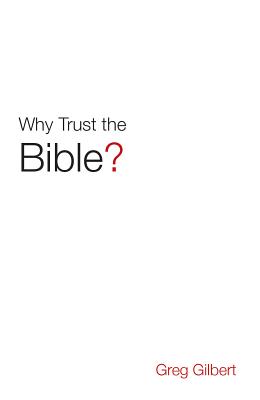Why Trust the Bible? (Pack of 25)

Why Trust the Bible? (Pack of 25)
Why Trust the Bible? Don't believe everything you read. Everybody knows that. So why trust the Bible? What can be known about its historical reliability? Doing History Even more than other religions, Christianity presents itself as history. At its heart, Christianity claims that something extraordinary happened in the course of time--something concrete, real, and historical. In the Bible, the New Testament declares that a man named Jesus was born to a virgin, claimed to be God, did miracles like walking on water and raising people from the dead, was crucified on a Roman cross, then rose from the dead and ascended into heaven to reign as King of the universe. Can we conclude confidently these things are true without simply presupposing the Bible is "the Word of God"? One way to find out is to approach the New Testament as a collection of historical documents that speak for themselves. But are these documents truly reliable, historically speaking? Answering that involves a series of questions. Are Our Bible Translations Accurate? Although translation from ancient languages is neither easy nor simple, scholars have been working at it for centuries. It really is possible for genuine, accurate, correct communication to occur through translation. In the New Testament, there is only a small percentage of content that has proven difficult in translation. The best Bible translations acknowledge these places with a footnote. Moreover, we can confidently say that not one major doctrine of orthodox Christianity rests on any disputed or uncertain passage. We know what the Bible says and what it means. Were the Original Sources Accurately Copied? As with other ancient books, the physical pieces of "paper" on which the original authors first wrote the New Testament have been lost to history. But we have thousands of other ancient writings (on papyrus, vellum, and parchment) with original-language text copied from each book of the Bible--about 5,400 distinct pieces when it comes to the New Testament, many going back to the first three centuries. They allow us to reconstruct with a huge degree of confidence what the originals said. (By comparison, for Julius Caesar's Gallic Wars we have at most ten readable copies, the earliest of which dates nine hundred years after Caesar's time.) By comparing ancient copies of New Testament content with each other, we find a remarkably stable history of copy-making. For a few passages there's genuine doubt about the original text
PRP: 21.53 Lei
Acesta este Prețul Recomandat de Producător. Prețul de vânzare al produsului este afișat mai jos.
19.38Lei
19.38Lei
21.53 LeiLivrare in 2-4 saptamani
Descrierea produsului
Why Trust the Bible? Don't believe everything you read. Everybody knows that. So why trust the Bible? What can be known about its historical reliability? Doing History Even more than other religions, Christianity presents itself as history. At its heart, Christianity claims that something extraordinary happened in the course of time--something concrete, real, and historical. In the Bible, the New Testament declares that a man named Jesus was born to a virgin, claimed to be God, did miracles like walking on water and raising people from the dead, was crucified on a Roman cross, then rose from the dead and ascended into heaven to reign as King of the universe. Can we conclude confidently these things are true without simply presupposing the Bible is "the Word of God"? One way to find out is to approach the New Testament as a collection of historical documents that speak for themselves. But are these documents truly reliable, historically speaking? Answering that involves a series of questions. Are Our Bible Translations Accurate? Although translation from ancient languages is neither easy nor simple, scholars have been working at it for centuries. It really is possible for genuine, accurate, correct communication to occur through translation. In the New Testament, there is only a small percentage of content that has proven difficult in translation. The best Bible translations acknowledge these places with a footnote. Moreover, we can confidently say that not one major doctrine of orthodox Christianity rests on any disputed or uncertain passage. We know what the Bible says and what it means. Were the Original Sources Accurately Copied? As with other ancient books, the physical pieces of "paper" on which the original authors first wrote the New Testament have been lost to history. But we have thousands of other ancient writings (on papyrus, vellum, and parchment) with original-language text copied from each book of the Bible--about 5,400 distinct pieces when it comes to the New Testament, many going back to the first three centuries. They allow us to reconstruct with a huge degree of confidence what the originals said. (By comparison, for Julius Caesar's Gallic Wars we have at most ten readable copies, the earliest of which dates nine hundred years after Caesar's time.) By comparing ancient copies of New Testament content with each other, we find a remarkably stable history of copy-making. For a few passages there's genuine doubt about the original text
Detaliile produsului










